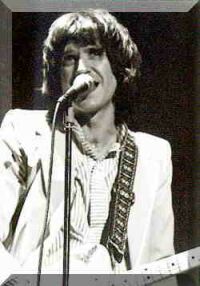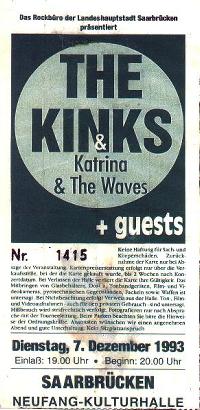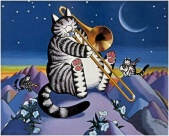|
|
| |
|
|
| |
 
Somewhere along the line Ray began to write songs. At first his lyrics were the conventional boy-girl stuff of the period (though laced with a rather unambiguous sexuality that was perfectly mated to the sonic blitz that the band was laying down), but he soon began to get itchy for something more serious. | |
| |
What he eventually came up with, "A Well-Respected Man", was a clever merger of his R&B roots with his other major passion, the music-hall style, it was to serve as a model for an entire school of British rock. Lyrically it was vaguely Dylanseque, put purely Davies' own were the song's wit and its particular kind of contempt of middle class values.
|
|
| |

From there Ray took off, turning out an uninterrupted series of brilliant singles and albums on subjects as diverse as steam powered trains, session men, lower-class drug addiction, and the setting of the sun on the British empire. He became a sort of rock n' roll reporter, filling his songs with telling little character studies - as in David Watts, in which he neatly skewers both the eternal golden schoolboy and his own jealousy of him. And he couched it all in a verbal style of almost Gilbertian cleverness:
"We are the Custard Pie Appreciation Consortium", he declares in one number.
As Mendelsohn (a much hated Kinks critic) observed:
"He was the first English Rock essayist to blow the whistle on his society's shoddy execution of its postwar dream of a classless society. He has been rock-in-general's most loyal advocate of the little working people". And more:
"Nearly all that he has written, of course, he has written of with incisive perception, colossal wit and profound humanism".
Since Ray is also perhaps the greatest rock n' roll singer who ever lived (!?), the possessor of dozens of different voices that run the gamut from Howlin' Wolf to Marlène Dietrich, this lyric genius should by rights have served to put the Kinks up there with the major mythic figures of the past decades.
|
|
| |
|
|
|
| |
|
|
No such luck however.
In fact, sometimes 1966, just as they were beginning to
perfect the new approach, their work died an absolutely
unheralded death in the USA, and it stayed there buried
until late 1969. Granted, the American audience often had
its head in the sand, but at least some of the fault is
Ray's; he has obstinately refused to be fashionable - he
claims, for instance that he didn't even listen to Sgt.
Pepper until 2 years later after it came out,
and I believe him.
|
|
|
| |
|
|
|
| |
This almost masochistic streak has run through much of his recent work, which has become increasingly autobiographical: the post-Arthur Kinks songs are more often than not concerned with Ray's personal psychological problems as they are with the plight of the working class hero. Ironically, as the Davies persona has emerged, the group has begun to sell records again.
Perhaps time has simply caught up with them; these days, the sexual confusion of the songs Lola, you recall, "walked like a woman and talked like a man", and Ray's on-stage antics were, thanks to Alice Cooper & Co., not quite so problematical. Or perhaps, more disturbingly, it's the old Judy Garland fan syndrome: the perverse appeal of watching someone of immense talent and sensitivity fall apart before your eyes. After all, Ray has gone so far to set his own suicide note to music, and the counterculture has amply demonstrated a taste for such ghoulishness. Or more likely, it's just that the music the band has made since Ray allowed himself the luxury of public self-analysis is in some ways more brilliant than ever. I find myself playing Muswell Hillbillies quite as often as Face to Face or Something Else, which leads me to think that Ray as an individual is every bit as interesting as Wicked Annabella, or Dandy, or Pretty Polly or any other creations of the Davies fancy.
For whatever reasons, people are aware of the Kinks now; their albums get respectable FM airplay, their concerts are sellouts, and even Andy Warhol's Interview has courted them - a far cry from the days when you had to hunt around to find a copy of Autumn Almanac or Mr. Pleasant. Even if they started playing up to their audience to extend that success (as witness the frequent intrusions of bisexual chic on Everybody's in Showbiz), I for one do not begrudge it to them. I wouldn't cast my pearls before swine either. It's a shame there aren't enough rock n' roll fans of pure and noble breed to keep the Kinks in the pearl business!
|
|
| |
|
| |
|
|
|
Next: Dave Davies |
|
|



![[Picture, oil painting, mixedmedia]](kinkpic/78kinks.jpg)
![[Ray Davies of Kinks rock group, rock n' roll singer]](kinkpic/ray4.jpg)


